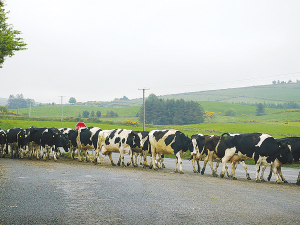DairyNZ opens applications for associate director role
DairyNZ is giving New Zealand farmers a unique opportunity to gain hands-on governance and leadership experience within the dairy sector.
 Farmers must ensure body condition score (BCS) targets will be met as per contract on takeover date.
Farmers must ensure body condition score (BCS) targets will be met as per contract on takeover date.
DairyNZ says all cattle, regardless of their purpose, must be treated with care and respect as they are being prepared for transport and then physically transported.
A comfortable and safe journey for cattle reduces effluent on public roads and ensures animals arrive at their destination fit and healthy.
DairyNZ recommends a checklist for transporting cows - for farmers and transporters. This checklist covers: transport planning, days of transport, checking to see if the animals good to go and how to take care of sick animals.
It says farmers must ensure body condition score (BCS) targets will be met as per contract on takeover date.
"If BCS, pasture cover targets or supplements on hand are not going to be met, have a proactive conversation with the other party as to what arrangement can be made to compensate," it says.
Planning for the movement of cattle must commence in the weeks and months prior to transport.
DairyNZ recommends completing Body Condition Scoring (BCS) of all animals for transport and making plans to ensure all stock will reach target BCS by moving day.
"Do a final check over for any cull cows that have been missed - arrange for removal from farm. Where possible, ensure they will go to the nearest processing plant. If processing plants are full then make a Plan B.
"Dry off as many animals as possible and do this with sufficient time to ensure that they are properly dried off on the day of transport and confirm the exact number of cattle you need to transport.
"Ensure all animals that are going to be transported are NAIT compliant (i.e. have NAIT tags in their ear and are registered with NAIT)."
Day Prior To Transporting
Day of Transporting
The World Wide Sires National All Day Breeds Best Youth Camp Best All Rounder plaudit has become family affair, with 2026 Paramount Cup winner Holly Williams following in her sister Zara's footsteps.
DairyNZ is giving New Zealand farmers a unique opportunity to gain hands-on governance and leadership experience within the dairy sector.
Herd improvement company LIC has posted a 5.2% lift in half-year revenue, thanks to increasing demand for genetics.
According to the latest Fresh Produce Trend Report from United Fresh, 2026 will be a year where fruit and vegetables are shaped by cost pressures, rapid digital adoption, and a renewed focus on wellbeing at home.
The Roar is a highlight of the game hunting calendar in New Zealand, with thousands of hunters set to head for the hills to hunt male stags during March and April.
OPINION: The past few weeks have been tough on farms across the North Island: floods and storms have caused damage and disruption to families and businesses.
OPINION: Fonterra may be on the verge of selling its consumer business in New Zealand, but the co-operative is not…
OPINION: What does the birth rate in China have to do with stock trading? Just ask a2 Milk Company.